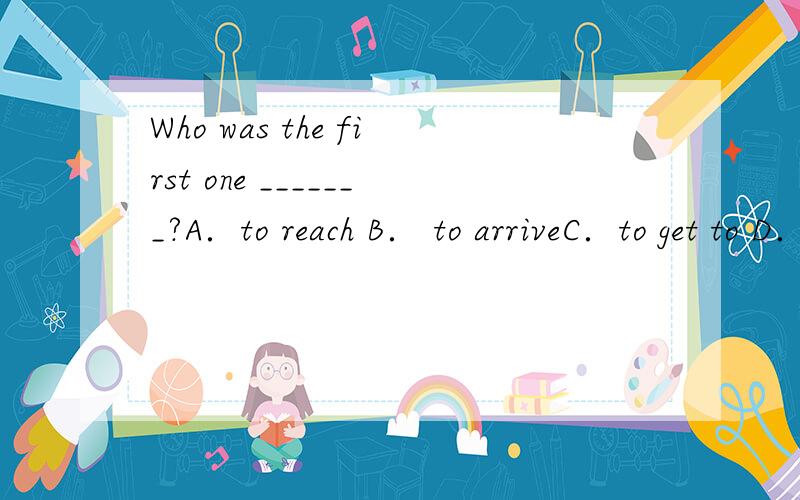Who was the first one _______?A.to reach B. to arriveC.to get to D. to arrive at 选择什么?并说出你的理由!..
来源:学生作业帮助网 编辑:作业帮 时间:2024/04/28 11:46:29

Who was the first one _______?A.to reach B. to arriveC.to get to D. to arrive at 选择什么?并说出你的理由!..
Who was the first one _______?
A.to reach B. to arrive
C.to get to D. to arrive at
选择什么?并说出你的理由!..
Who was the first one _______?A.to reach B. to arriveC.to get to D. to arrive at 选择什么?并说出你的理由!..
B
主要考察“到达”的意思
到达,reach = arrive at(小地方)=arrive in(大地方)= get to
这后面全部需要加地点,而且是具体的,作宾语
如果后面没有地点,就是没有宾语,
只能用arrive = get
所以,只能选择B
或者,你可以这样理解,A=C=D,排除法,答案B
肯定正确
B
印象中arrive在疑问句中可以单独表示到达而不用加介词。
B
理由是: arrive 是不及物动词,后面可不跟名词,reach是及物动词,后面必须跟名词。
选A
arrive,get,reach都表示“到达”,但在用法上有区别。
(1)arrive是不及物动词,后面跟介词in或at。到达一个较大的地方(国家、城市)一般用in,到达一个较小的地方(如小村庄、车站)一般用at,例如:
When did you arrive in Beijing?
(你什么时候到达北京?)
They...
全部展开
选A
arrive,get,reach都表示“到达”,但在用法上有区别。
(1)arrive是不及物动词,后面跟介词in或at。到达一个较大的地方(国家、城市)一般用in,到达一个较小的地方(如小村庄、车站)一般用at,例如:
When did you arrive in Beijing?
(你什么时候到达北京?)
They arrived at the station at seven o’clock.
(他们七时到达车站。)
(2)get也是不及物动词,表示“到达”的意思时,后面要跟介词to,再接表示地点的名词,例如:
Can you tell me how l can get to the station?
(你能告诉我怎样才能到达车站吗?)
(3)reach是及物动词,后面无须跟介词,例如:
We reached Guangzhou on February 18.
(我们在二月十八日到达广州。)
收起
选A reach是及物动词